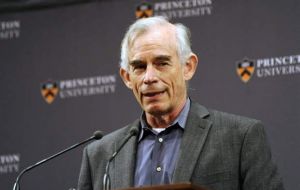MercoPress. South Atlantic News Agency
Economics Nobel Prize winner predicted ten years ago Euro lack of “clear fiscal backing”
 Christopher Sims 2002 paper was “The precarious fiscal foundations of EMU”
Christopher Sims 2002 paper was “The precarious fiscal foundations of EMU” The winner of the Nobel Prize in economics says that a decade ago he feared the Euro would face problems because there wasn't enough fiscal coordination between countries to support it.
Christopher Sims, who shares this year's 1.5 million dollar award in Economics with fellow American Thomas Sargent, said Wednesday that the European financial crisis was partly caused because the common European currency, now shared by 17 EU members, didn't have “clear fiscal backing” when it was created.
Sims referred to his 2002 paper ”The precarious fiscal foundations of EMU (European Monetary Union)“ in which he wrote about the risks of a Euro crisis and the possibility of it spreading.
His conclusion at the time had been that it was ”likely there would be some kind of a crisis,“ he told reporters.
Sims said Wednesday he could not propose measures for European governments to take. ”That is still the question. We don't know yet.”
Sims was in the Swedish capital with this year's other Nobel laureates in Economics, physics, chemistry and medicine.
They have gathered for a week of lectures and interviews before their prizes are awarded at a ceremony on Saturday, followed by a banquet.
Sims and Sargent won the Nobel Prize for research on the cause-and-effect relationship between the economy and government policy, which helps policymakers determine if governments should cut deficits or spend more to help invigorate the global economy.
The Economics Prize is not among the original Nobel awards but was created in 1968 by the Swedish central bank.
It is handed out with the other Nobel science prizes in Stockholm on Dec. 10, the anniversary of Swedish industrialist Alfred Nobel's death in 1896.
The Nobel Peace Prize is presented in Oslo, Norway, on the same day.




Top Comments
Disclaimer & comment rulesCommenting for this story is now closed.
If you have a Facebook account, become a fan and comment on our Facebook Page!